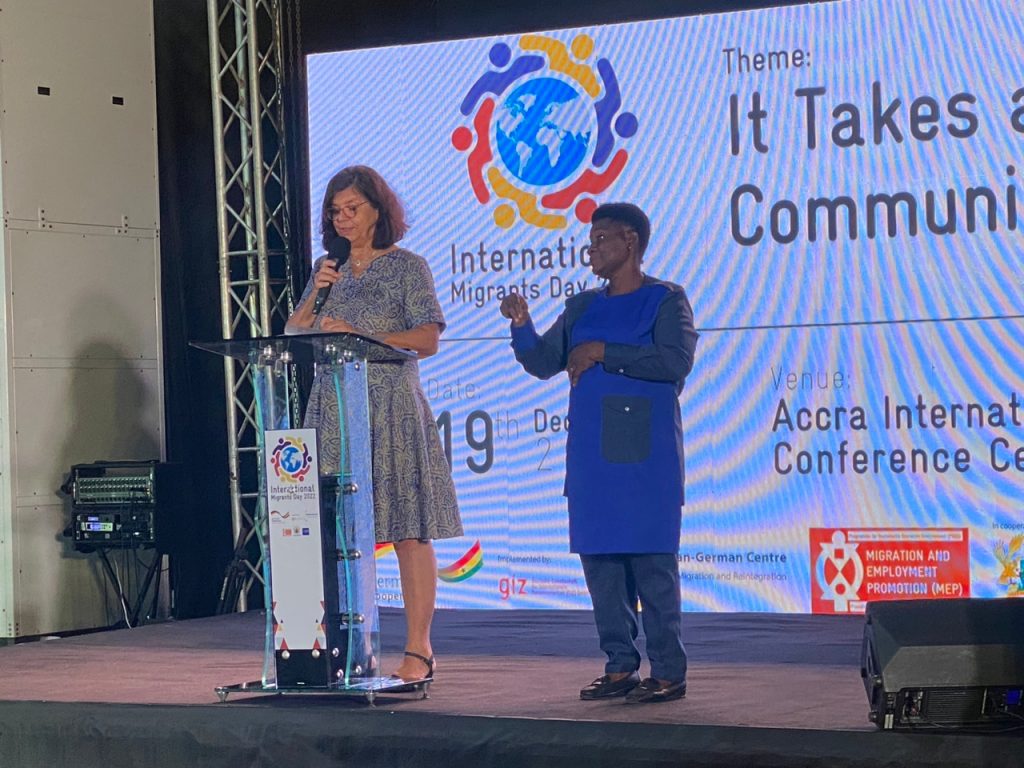By Morkporkpor Anku
Accra, Dec 23, GNA – Madam Regina Bauerochse Barbosa, Country Director, Gesellschaft für Internationale Zusammenarbeit (GIZ), has appealed to traditional rulers, opinion leaders and members of various communities to cease the stigmatisation towards returned migrants.
She said when irregular migrants returned, communities should welcome them and allow them to contribute to the development of their communities.
Madam Barbaso remarked during the celebration of International Migrants Day 2022, on the theme: “It takes a community” in Accra.
The celebration sought to present opportunities to reflect on the role of people who cross international borders in search of a better life, their positive contributions, and the challenges they faced as they sought to reach their full potential and capabilities.
The event organised by the Ghanaian-German Centre for Jobs, Migration and Reintegration (GGC) is for beneficiaries of Team Migration projects to mount an exhibition dubbed: “Migration Solution 360 Fair” to market their products.
Madam Barbaso said it took a community to properly reintegrate returned migrants, end stigmatisation, and own and sustain the various community employment promotion interventions.
She said GIZ and on behalf of the Federal Ministry for Economic Cooperation and Development (BMZ) partnered with the International Organisation for Migration (IOM) to implement these employment promotion interventions in 16 communities in the Bono, Bono East and Ahafo regions.
“These employment promotion interventions included animal husbandry, crop farming, gari processing, soap making, fashion design and block manufacturing,” she added.
Madam Barbaso said their encouragement and support to returned migrants to take the lead on these projects helped to mitigate the stigma they often suffered when they returned to their communities, and their involvement in these projects also sped their reintegration into society.
She said, “According to the latest World Bank Migration and Development Brief, Ghana maintained its position as the second largest recipient of diaspora money transfers and remittances in Africa, recording 4.7 billion dollars in inflows in 2022.”
“Opportunities exist for these diaspora money transfers and remittances to serve as liquidity and capital investment for micro, small and medium enterprises in Ghana,” she added.

Madam Barbaso said regular migration was also an opportunity for economic development in the country of origin.
She said to make informed migration decisions and maximise the benefits of migration for the people, the advised-on procedures, and requirements for regular migration.
The GGC is commissioned by BMZ and implemented by GIZ in Ghana in collaboration with the Ministry of Employment and Labour Relations (MELR).
Madam Fatou Dialo Ndiaye, Chief of Missions at IOM, said the theme served as a reminder of the interdependence, shared humanity, and the individual contributions made to shared communities.
She said IOM and GIZ had collaborated since 2018 with the primary objective of contributing to the provision of comprehensive, gender-sensitive, and sustainable reintegration assistance to Ghanaian returning migrants and opportunities for potential migrants.
Madam Ndiaye said the collaboration highlighted that community-based projects facilitated reintegration efforts by local players.
“When an important number of migrants return to a community, these types of initiatives help to ease tensions between returnees and locals, and to reduce stigma,” she added.
Mr Ernest Berko, the Deputy Director, Policy Planning, Monitoring and Evaluation, MELR, said that just as protection was provided to workers in-country, it was also obligated by the government to ensure that Ghanaians working outside the country were also protected.
He said the government kept working to discourage irregular migration and promoted safe pathways to migration.
Mr Berko said the Ministry was implementing a national migration policy, to strengthen the labour migration governance and promote the developmental aspects of migration for migrants and their families.
Mr Berko said the Ministry was doing career guidance to support the youth to acquire employable skills, to be able to start personal businesses and to avoid illegal migrations.
GNA